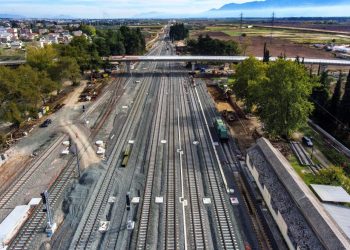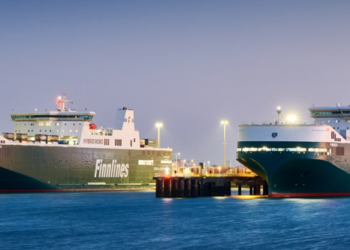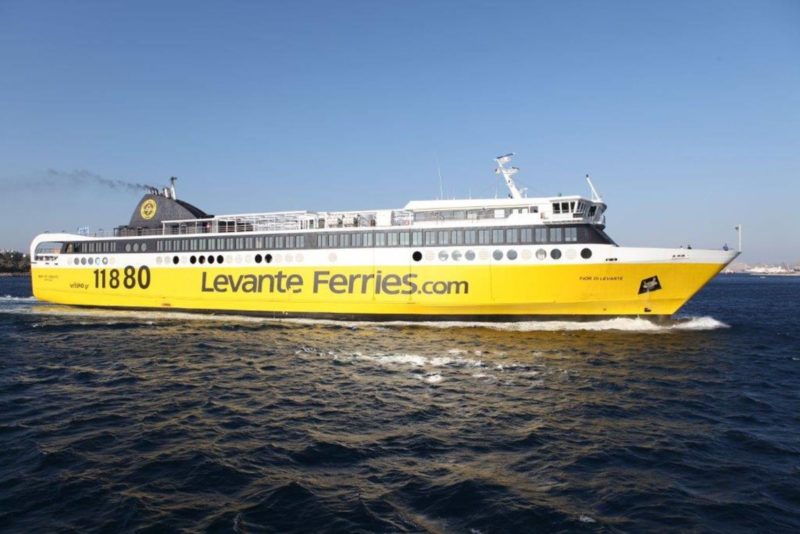The Board of Directors of Ferrovie dello Stato Italiane, chaired by Nicoletta Giadrossi, examined and approved the Company’s draft annual Financial Report, which also includes the Group’s consolidated financial statements, as of 31 December 2022.
Luigi Ferraris, the Group’s Chief Executive Officer, said: “The positive results achieved in 2022 confirm Group’s key role in providing the Country with an efficient and integrated infrastructure, mobility and freight logistics system, as well as making our cities more sustainable. The 12% year-to-year revenue growth is the result of the operational capacity of the Group which was able to achieve a substantial increase in the demand for passenger mobility. In this scenario, the number of Frecce travellers has doubled compared to 2021. All economic indicators are growing, driven by ordinary operations, with EBITDA improving by more than 1.1 billion euro, with a relevant reduction in Covid supports in 2022 compared to 2021, for about 800 million euro. The Group closed the year with a +5% net profit. The results achieved and the activities initiated constitute a solid basis for completing the further objectives linked to the NRRP, the other strategic works for the Country, and fostering the development of a new integrated mobility”.
Economic and financial results
The Group’s new governance, expressed in the ten-year Industrial Plan through the creation of the four business hubs (Infrastructure, Passenger, Logistics and Urban), shows the first positive results.
The Group closes 2022 with a positive Net Operating Income of 202 million euro, a clear recovery from the economic and financial impacts of the health emergency generated in the previous two financial years and despite the heavy and negative development of the Ukrainian conflict, which continues to be a strong social, political, economic and financial instability factor not only at European level, with the consequent significant criticalities on the cost of materials and commodities.
| In millions of € | 2022 | 2021 | Change | % |
|---|---|---|---|---|
| Operating revenues | 13.664 | 12.242 | 1.422 | 12% |
| EBITDA | 2.212 | 1.888 | 324 | 17% |
| EBIT | 262 | 193 | 69 | 36% |
| Net Result | 202 | 193 | 9 | 5% |
| Technical Investments (in Billions of €) | 11,3 | 12,5 | (1.2) | (10%) |
All margins for the year show positive and increasing balances. In fact:
- Group Operating Revenues increased to 13.7 billion euro, an overall increase of 1.4 billion euro (+12%), compared to the 2021 financial year, primarily driven by the significant recovery in the demand for rail and road transport services;
- the increase in Revenues was accompanied by the growth in the Gross operating profit (EBITDA) of 324 million euro reaching 2.2 billion euro compared to 1.9 billion euro in the previous year (+17%); in fact, the Group has shown strong resilience in the recovery of operating performance across the various businesses, especially considering that the Covid-19 relief contributions on EBITDA was only 172 million euro in 2022 compared to 958 million euro in 2021;
- EBIT stood at a positive 262 million euro (with an EBIT Margin increasing from1.6% to 1.9%), increased by 36% (which corresponds to +69 million euro) compared to 2021. This is an increase by +112% compared to 2021 (which corresponds to +855 million euros) net of covid-related subsidies.
More specifically, Revenues from transport services, at 6.9 billion euro, increased by 996 million euro compared to 2021, both domestically and internationally. Specifically, transport-related segments show a positive trend, primarily due to the renewed mobility of people and goods; in fact, both revenues related to rail passenger services (overall +962 million euro) and revenues related to rail freight transport (+45 million euro) have increased, also supported by partnerships with major international players, including HUPAC. Revenues from road and maritime passenger transport decreased (-11 million euro) due to the divestment of the LPT road services business in Tuscany, despite the business trend being on the rise.
The overall increase in transport-related revenues compared to 2021 is a direct effect of the operational management and of a revival in passenger-km demand volumes (+106.5% in market services, +50.3% in intercity service, +39.9% in regional service) and train-km production volumes (+37.1% in market services, +4.7% in intercity service, -1.5% in regional service), made easier by the recovery of general mobility and the easing of mobility restrictions and maximum capacity limitations implemented by the Italian government, in line with decisions made in other European countries, to contain the Covid-19 pandemic. All while keeping rates the same for market-based services as well.
Revenues from infrastructure services, amounting to 3.6 billion euro, registered an increase of about 18% compared to the previous period (+549 million euro) owing to higher traffic volumes circulating on the rail network and service and concession fees related to circulation on ANAS road infrastructure.
Operating costs for the year amounted to 11.4 billion euro, up 1.1 billion euro (+11%) from the previous year due to the strong recovery of business activities, but also due to the incorporation of the strong disruptions resulting from the downward inflation spiral generated by the social, political, economic and financial instability associated with the Ukrainian conflict, the weakening of the Chinese economy, and procurement difficulties along value chains, resulting in the rising cost of raw materials, primarily that of electricity.
On the Investment front, although the international economy showed a widespread slowdown due to high and persistent inflation and worsening financial conditions, which gradually led to a downturn in consumption and investment, in 2022 the FS Italiane Group continued implementing investment development actions while retaining a central role in supporting the national industrial system. In fact, in 2022 an overall technical investment expenditure of 11.3 billion euro, with particular reference to the development and renewal of the infrastructure, transport and logistic sectors, was managed. The increase compared to 2021, when excluding the financial advances from the comparison, is equal to more than 9%, thereby strengthening the Country (98% investment is on the national territory and more than 9 billion euro in rail and road infrastructure, including, in particular, the works on the railway network of the Terzo Valico dei Giovi and Nuovo Valico del Brennero as well as the Brescia-Verona-Vicenza, Naples-Bari and Turin-Lyon lines).
Closely related to the above, the decisive role of the FS Group in the Next Generation EU (NGEU) Programme, launched at the end of May 2020, deserves to be mentioned. To date, of the 236.1 billion euro (including React EU, NRRP and the Complementary Fund) allocated to Italy, 25.9 billion euro of the funds under the NRRP and the Complementary Fund have been assigned to Group companies, in particular to Rete Ferroviaria Italiana (RFI), as implementing parties. RFI plays an extremely important role in the success of the Plan, especially with regard to Mission 3 (interventions on the National Railway Infrastructure, interventions on the Regional Railways, for the monitoring and digital surveillance of infrastructures, and for Railway Connections), under which a total of 24.29 billion euro, or 11% of the entire NRRP for Italy, has been allocated to the initiatives for which it is responsible.
It should be noted that 3 European milestones were planned for the end of 2022, all of which have been achieved (Naples-Bari works contract worth 0.37 billion euro, ERTMS works contract worth 3.27 billion euro, and Palermo-Catania works contract worth 1.21 billion euro). In addition to these, there are 3 “national” milestones and 5 quantitative “national” targets, all of which have also been achieved.
In parallel to all of the above, the FS Italiane Group retains a high degree of capital and financial solidity, with shareholders’ equity amounting to approximately 41.9 billion euro at the end of 2022. The Net Financial Position (NFP), with net debt of 7.9 billion euro, shows a decrease of 1 billion euro compared to 31 December 2021, with an NFP/equity ratio of around 0.2 essentially unchanged from the previous year. Credit ratings also give full recognition to the Group’s capital and financial reliability, with “BBB” from Standard & Poor’s confirming in early August 2022 its rating with a “stable” outlook and Fitch confirming in November its rating at “BBB”, with a “stable” outlook. Specifically, Fitch raised one of the scores assigned to FS from “moderate” to “strong”, based on the “government-related entity rating criteria” method, as a result of the Group’s improved assessment on the “Social and Political Implications for Default”, due to FS’s key role in the infrastructural development and green transition of the Country.
Also, an important point to highlight is that about 85% of the economic value that the Group generated through its activities (revenues from sales and services and financial income) was reallocated to its stakeholders. This amounted to 11.7 billion euro and included, among other things, operating costs, compensation to employees, and payments to lenders and the public administration. The economic impact that the Ferrovie dello Stato Italiane Group has generated with its activities and investments is more than 1.5% of the national Added Value, while employment is equivalent to more than 300 thousand units, including direct employment and resulting from indirect and induced effects.
Environmental, social and governance sustainability
FS Italiane confirms the improvement in the climate-altering emissions trend, despite a generalised increase in energy consumption (2.01 million tonnes of CO2 equivalent against 2.09 million tonnes in 2021). This positive shift is primarily attributable to the renewal of the railway fleet with more energy-efficient vehicles, the improvement of the electricity generation mix and the decrease in the use of fossil fuels. The commitment to special waste recovery is also significant, exceeding 95%, with production in 2022 decreasing compared to previous years.
In 2022, the Group also pursued its commitment to climate change risk mitigation, by promoting a structured programme aimed at improving service performance and reliability, and reducing emerging climate-induced costs.
Sustainable finance instruments play a significant role in this framework. Specifically, two green bonds were issued in 2022: the first in July, worth 200 million euro, with the European Investment Bank (EIB), to support Trenitalia’s purchase of high-speed trains for the Italian and Spanish lines, and the second, worth 1.1 billion euro, the proceeds of which were used to purchase new trains and cover the maintenance of Trenitalia’s electric rolling stock, as well as – for the first time – investments for the completion of RFI’s Turin-Milan-Naples high-speed network. All investments financed with “green” bonds meet the EU Taxonomy criteria implemented with EU Regulation 2020/852, as confirmed by the Sustainalytics second party opinion regarding FS’s overall Green Bond Framework, which, to date, allows all the railway businesses in which the Group is active to be funded through green bonds. Moreover, in June, a new private placement bond was finalised by FS for a value of 160 million euro with Eurofima, (in line with ESG finance principles) to finance rolling stock used by Trenitalia for public service.
Moreover, in July 2022, FS signed the increase of the committed and revolving credit facility entered into in 2021 from 2.5 to 3 billion euro, which is fundamental for the funding of all of the Group’s activities on a general-purpose basis. Despite a volatile and bullish market environment, the credit facility was increased without altering the pricing terms and conditions of the original agreement, which provides for review mechanisms upon achievement of ESG targets, relating to four Key Performance Indicators, all of which have been achieved to date, confirming the FS Group’s commitment to sustainability.
Moreover, for some time now, the FS Group has been working with its suppliers on integrating and consolidating environmental and social elements in the procurement phase. More than 700 suppliers have been involved since 2017, including through the use of EcoVadis, one of the most internationally accredited platforms for assessing the sustainability performance of the supply chain. In 2022, the “Sustainable Supply Chain Management” project was also implemented to ensure, as of 2023, that the ESG assessment is progressively applied to the economic operators/suppliers of all Group companies, through a dedicated IT platform. The Group’s Business Plan also provides that, as of 2026, all economic operators intending to work for the FS Group must undergo the ESG assessment using the IT platform implemented by FS.
In 2022 in terms of eco-sustainable activities and the above-mentioned EU Regulation, all Group companies conducted a thorough review of the eligible activities identified in the previous year, based on new and improved knowledge, and a technical review of the “Do No Significant Harm” – DNSH analysis criteria and compliance with the minimum safety clauses, to determine whether their activities were aligned with sustainability requirements (aligned activities). The analysis showed that 84.2% of capital expenditure, 60.6% of revenues and 44.5% of operating costs were related to activities in line with the European Taxonomy.
The Group’s workforce increased from 81,906 to 85,361 people, with a turnover resulting from 9,687 people joining and 6,232 leaving, mainly due to generational turnover. The number of women is steadily increasing, with a 20% incidence in 2022 (+0.9 percentage points), in line with the Group’s objectives and actions to reduce the gender gap.
The Financial Reports section of the fsitaliane.it website contains a summary document detailing the main results achieved during the period by the Ferrovie dello Stato Italiane Group.
The Manager responsible for preparing the corporate accounting documents, Roberto Mannozzi, declares, pursuant to paragraph 2 of article 154-bis of the Consolidated Finance Act, that the accounting information contained in this document corresponds to the document results, books and accounting records.
The document also contains summaries of financial information that should not be considered as a substitute for the Ferrovie dello Stato Italiane SpA and FS Group financial statements, or forward-looking statements that do not constitute a guarantee of future events and results.
(Ferrovie dello Stato Italiane)





















































